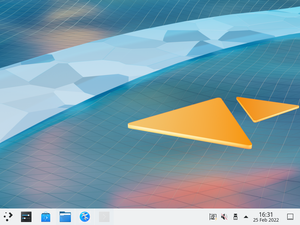KDE

Plasma is the desktop environment from KDE, a software project comprising of a collection of libraries known as KDE Frameworks, and several applications known as KDE Applications. Their UserBase wiki has detailed information about most KDE Applications.
Prerequisites
- Internet connectivity, unless the packages have been pre-fetched into a local cache.
- Install appropriate Graphics driver drivers for your hardware. Without graphics drivers, errors are likely to occur when starting your desktop.
- A non-root user account with appropriate groups for desktop usage.
- The community repository must be enabled.
- Set up eudev.
- Install and enable D-Bus. Without D-Bus, icons and keyboard shortcuts may be missing.
- Enable Elogind service
- If you need Xwayland and Xorg, run setup-xorg-base.
Installation
setup-desktop, isn't available for the armhf or s390x architectures. However, the rest of Plasma may be installed separately to potentially get a functional desktop.setup-desktop
The Alpine Linux script for quickly setting up a desktop is:
# setup-desktop
On running the above command, you will be prompted to select a desktop environment.
Which desktop environment? ('gnome', 'plasma', 'xfce', 'mate', 'sway', 'lxqt' or 'none') [none]
Once you have chosen a desktop environment, this script installs the chosen desktop along with necessary packages, firefox browser (which can be modified by setting up the BROWSER variable) and adds necessary services to run on startup. You can reboot when complete, and the system will boot into a graphical login screen with the chosen desktop environment, except for sway. To view the packages installed by the script: $ cat /usr/sbin/setup-desktop When Plasma is chosen, the above script additionally installs PipeWire for audio and SDDM as display manager.
Manual
The following command will install the Plasma desktop as specified by the plasma metapackage, including the sddm display manager and other assorted niceties.
# apk add plasma-desktop-meta
KDE Applications
To install the full set of KDE Applications, install kde-applications. You can also choose to install a smaller set of applications by installing any of the subpackages:
ppc64le or s390x architectures, all kde-applications* packages are only available in Edge, from the community repository (verified in December 2025).- kde-applications-accessibility
- kde-applications-admin
- kde-applications-base
- kde-applications-edu
- kde-applications-games
- kde-applications-graphics
- kde-applications-multimedia
- kde-applications-network
- kde-applications-pim
- kde-applications-sdk
- kde-applications-utils
- kde-applications-webdev
Starting Plasma
Plasma can be started using a display manager or from the console.
Using a display manager
When Plasma is installed via the plasma meta-package, the display manager is set up using sddm.
Make sure you enable and start the SDDM service.
# rc-update add sddm # rc-service sddm start
- Select Plasma to launch a new session in Wayland
- Select Plasma (X11) to launch a new session in Xorg
From the console
For the Wayland session run:
$ XDG_SESSION_TYPE=wayland dbus-run-session startplasma-wayland
The Xorg session can be launched by installing xinit and appending exec startplasma-x11 to your .xinitrc file. To start X:
$ xinit
Discover
Discover is the application installer from KDE. The alpine linux package discover is automatically installed if plasma-desktop-meta package is installed or if setup-desktop is used to install Plasma.
Install the packages discover-backend-apk and discover-backend-flatpak to use Discover as a graphical interface to Alpine Package Keeper and Flatpak respectively.
Troubleshooting
HiDPI Scaling
When using high resolution screens, e.g. 4K, you might need to apply scaling so the fonts and windows are not too small.
In order to achieve this you can open Settings -> Display and Monitor and change the slider under Global Scale to an appropriate value.
You can also change the mouse cursor and icon size under Settings -> Appearance.
If your taskbar and window decorations are still too small, you might want to create the file ~/.xprofile to define the PLASMA_USE_QT_SCALING environment variable:
export PLASMA_USE_QT_SCALING=1
After creating this file, you may need to restart your session to apply this modification.
Inputs not Working
All stated prerequisites should be sufficient to install Plasma, but certain reports signal that xf86-input-libinput corrected some situations where inputs did not respond in Wayland. That package is an X11 wrapper for libinput and therefore not fully adequate in Wayland; rather, libinput-libs may be more appropriate. Further testing, reports and contributions are encouraged, if the issue is encountered.
To bypass unresponsive inputs, the libinput-libs package would require being installed in a chroot hosted on another installation.